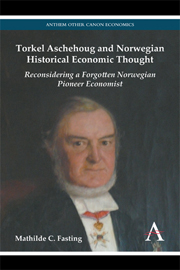 Torkel Aschehoug and Norwegian Historical Economic Thought
Torkel Aschehoug and Norwegian Historical Economic Thought Published online by Cambridge University Press: 05 March 2014
The Importance of Principles
Another huge influence on Aschehoug, namely the publication of Alfred Marshall's (1842–1924) Principles of Economics in 1890, is important in understanding his work. It must be remembered that he was the first Norwegian economist who had a clear ambition in understanding, presenting and incorporating marginal theory in his analysis. It was an event which contributed to the evolution of political economy into economics, sending a signal that it was as much a formal science as physics, mathematics or other precise bodies of knowledge. But Skousen adds, ‘Later in life, Marshall was to regret this attempt to scientize economics, suggesting that we are still greatly ignorant of economic behaviour, but the die was cast. Economics would soon become a social science second to none in rigor and professional status.’ Principles is the single most quoted book in Socialøkonomik, which makes it worthy of further investigation. What did Marshall write that was so important to Aschehoug, and how did he follow or use the theories of Marshall? The clue lies in the prefaces, Book I and the appendices, and more obviously Book V. As Marshall wrote himself in 1920, ‘But of course economics cannot be compared with the exact physical sciences: for it deals with the ever changing and subtle forces of human nature.’ The marginal revolution was already ongoing long before the first edition of Principles and other authors were well known to Aschehoug, but Marshall was the first, according to Aschehoug, to explain marginal theory correctly.
To save this book to your Kindle, first ensure [email protected] is added to your Approved Personal Document E-mail List under your Personal Document Settings on the Manage Your Content and Devices page of your Amazon account. Then enter the ‘name’ part of your Kindle email address below. Find out more about saving to your Kindle.
Note you can select to save to either the @free.kindle.com or @kindle.com variations. ‘@free.kindle.com’ emails are free but can only be saved to your device when it is connected to wi-fi. ‘@kindle.com’ emails can be delivered even when you are not connected to wi-fi, but note that service fees apply.
Find out more about the Kindle Personal Document Service.
To save content items to your account, please confirm that you agree to abide by our usage policies. If this is the first time you use this feature, you will be asked to authorise Cambridge Core to connect with your account. Find out more about saving content to Dropbox.
To save content items to your account, please confirm that you agree to abide by our usage policies. If this is the first time you use this feature, you will be asked to authorise Cambridge Core to connect with your account. Find out more about saving content to Google Drive.